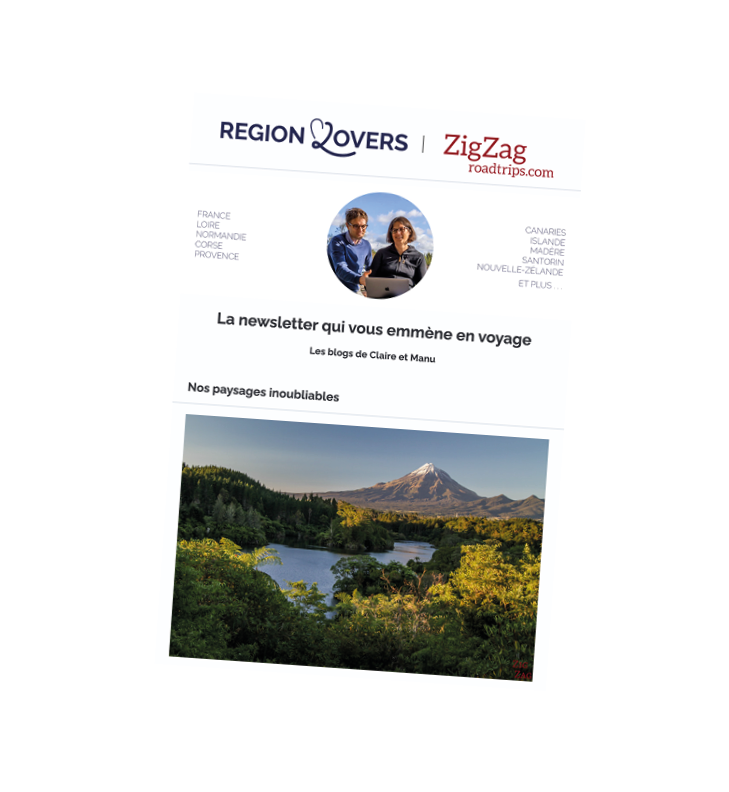The nature reserve of Scandola in Corsica is an ancient caldera, a paradise for geologists and a dream place for nature lovers.
This fascinating coastal area is only accessible by boat or on foot (long day hikes).
Here is our practical guide with map, photos and tips to plan your visit!
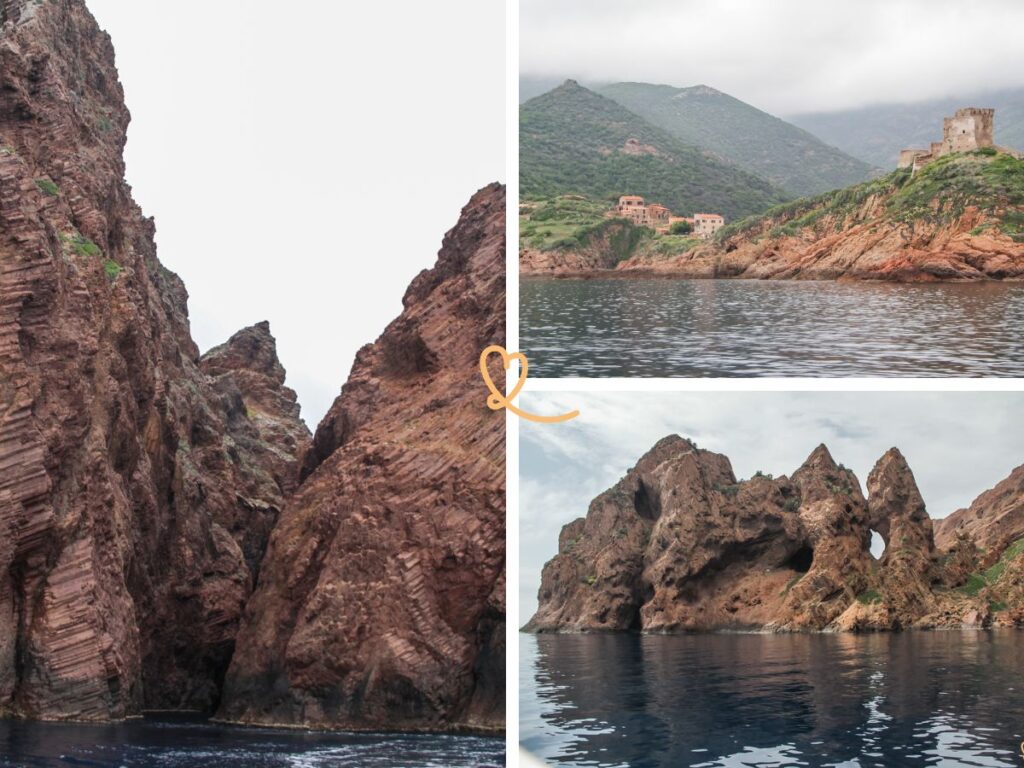
Why visit the Scandola Reserve in Corsica?
A sumptuous coastline
The Scandola reserve is protected and listed on the Unesco heritage list for a good reason. It is one of the most fascinating coasts of the Mediterranean.
The exposed red rock of an ancient caldera plunges into the deep blue waters of the sea.
In addition, erosion has revealed unique geological features that you will have the opportunity to see from the boat!
We think it is one of the most beautiful places in Corsica!

Geology of Scandola – summary
The Scandola peninsula is in fact a caldera (elliptical depression resulting from the collapse of the magma chamber following volcanic activity).
It was formed 250 million years ago by an old underwater volcano.
The magmatic rock (softer than the calanques de Piana) has been eroded by the wind and the sea for millions of years.
This is why it is an ideal place to admire the structural elements that have been revealed by this erosion. The most famous are the horizontal basalt organs! (Photos later in the article)

A protected reserve
The reserve covers about 20 km2 on land and water.
Thanks to the protection of the peninsula and the waters surrounding it, the reserve is now rich in fauna and flora.
On the red cliffs, the vegetation appeared until 500m of altitude.
And thanks to the purity of the water, marine life flourishes.
That’s why access is limited to boating and hiking.

Video – virtual visit
Before sharing more tips and photos, here is a short video of the boat ride around the Scandola caldera with the fascinating rock formations and beautiful scenery.
How to visit the Scandola Nature reserve – Map
Where is the Scandola reserve? Card
- On the central-western coast of Corsica
- On the side of Piana, one of the most beautiful destinations of Corsica(see our list)
- Northern part of the Gulf of Porto
- Access by hiking from the area of Porto Ota
- More departures by boat from Porto Ota
- But they also leave from Calvi and Ajaccio
- Ajaccio to Porto – 2h drive
- Calvi to Porto – 2h drive
- Bastia to Porto – 3h30 drive
- Here is a map to help you find your way
- and see all our tips for planning a dream trip to Corsica here
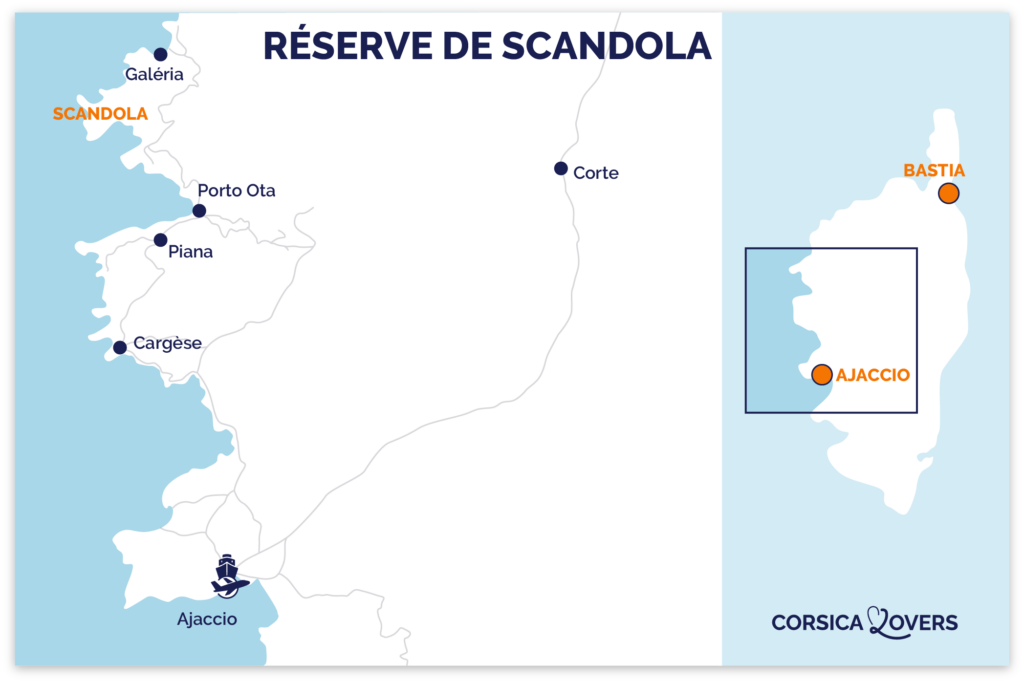
OUR TIPS FOR RENTING A CAR IN Corsica
- Compare prices on our preferred platform: DiscoverCars – one of the best rated sites.
- Choose a car that is powerful enough (the roads are steep) but compact (some passages are narrow).
- Think of thecomplete insurance (some roads are tortuous and narrow).
- There is a lot of demand, book it early.
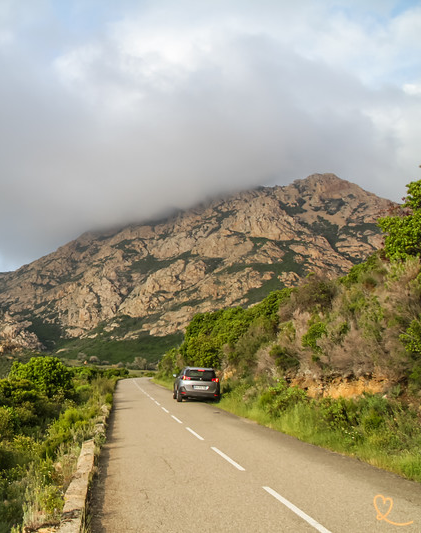
How to get there?
Option 1 – drive to Porto Ota then boat tour
This is our preferred option, as there is more to see around Porto Ota with the calanques de Piana and charming villages.
Option 2 – drive to Porto Ota or further then hike
If you are a fan of hiking, this is the best way to see some of the geological features. The most famous path is the Girolata hike, 2 hours from the Col de La Croix.
Option 3 – boat tour from other cities
Porto Ota is quite isolated on the west coast. The road to reach it is winding and long (but very beautiful).
If you don’t have the time, or the courage, there are also boat departures from other cities. The excursion will be longer, but the views of Corsica from the sea are always fascinating so it’s nice.
You can depart from:
- Sagone
- Cargese
- Ajaccio
- Calvi
See a lot of options for boat tours on Viator and on Getyourguide.
We chose the combined tour of Piana and Scandola from Porto Ota. It was beautiful!

When to visit and how long to stay
From Porto Ota the boat tours with the Scandola reserve last from 3h to 4h30 depending on whether you combine with the creeks.
The reserve of Scandola is magnificent in all weathers.
If the conditions are too bad, the outings are cancelled.
But if it rains just a little, don’t hesitate to go around. The sea can then be calmer and the colors stand out more.
This is one of the most popular experiences in Corsica. If you are visiting in the middle of summer, be sure to book in advance.
The end of the afternoon offers better lights because the coast is facing west.
STAYING NEAR THE CALANQUES OF Piana
To enjoy this show, it is better to spend a night or several!
The colors change with the sunset and the weather.
Our suggestions:
Option 1: Piana village
Sleep on higher ground in the village of Piana, in the heart of the Calanques.
Many hotels have incredible views of the Gulf.
- Hotel Scandola and its views of the Gulf of Porto – see prices, photos and availability
- Hotel Capo Rosso and its famous swimming pool with view – see prices, photos and availability

Option 2: Porto Ota village
Spend the night in Porto Ota, the village at the center of the gulf. It’s ideal for boat tours.
- Residence Capu Seninu with mountain views – see prices, photos and availability
- Hotel les Flots Bleus with its view of the Genoese tower – see prices, photos and availability

See all our reviews in our article: where to sleep in Piana
The reserve of Scandola by boat
Choice of boat
Different types of boats allow the visit of the creeks and Scandola.
It’s up to you to choose what you prefer
Medium size boats
- Advantages: there is a covered area and you can move around
- But: the groups are more numerous and the maneuverability more limited

Speedboat
- Advantages: small groups, possibility to get very close, fun speedboat experience
- But: no possibility to stand up, no protection from the rain, no possibility to stabilize for the pictures
See a lot of options for boat tours on Viator and on Getyourguide.

On board the boat
We opted for the medium size version.
It was pretty comfortable with seats out of the elements but still a good view.

Departure from Porto Ota
The largest number of departures are from Porto Ota, in the heart of the Gulf of Porto.
Moving away from the port, you can see the famous single square tower that protects the gulf and communicates with that of Capo Rosso.

Subscribe to our Newsletter
- Get away from it all with Region Lovers’ beautiful destinations!
- Once a month
- Advertising-free
Start of the boat tour
The beginning seems long enough. The landscapes are beautiful, but we look forward to arrive at the rocky formations.
All the beginning of the journey, we advance at city pace rather far from the coasts.
Passage in front of Monte Senino
Before reaching the Scandola reserve, there is a first promontory.
The mountain is called Monte Senino. It is located between the Gulf of Porto and the Gulf of Girolata.
Its origin is also volcanic, probably of the same structure as Scandola.
On the boat, the excitement is mounting. This pyramid shape already displays beautiful colors. It’s promising, isn’t it?

First bay of the Scandola reserve – photos
The first bay where we stopped around the Scandola peninsula was already beautiful.
The rock is really sculpted by the sea and the wind.
You can see that the texture is much softer than in the calanques de Piana, which explains why it is much more eroded.

The boat can get very close to allow you to admire the numerous cavities and how the vegetation finds all possible spaces to grow.

The rock is pinkish with variations in texture.

USE OUR GUIDE TO PLAN A
DREAM TRIP TO Corsica
All the information you need for your trip:
- 7 maps that make planning easier
- 130+ pre-selected locations
- Practical advice
- + 220 photos to help you choose
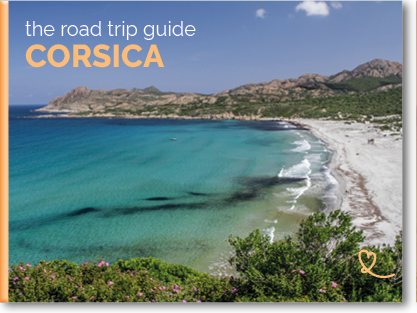
Cala di Ficaccia – The colors of Scandola
Then you sail around Cala di Facaccia.
This is where you can see the most color variations.
- As you can see below, some rocks are yellow, orange and red, they are rhyolites.
- While the dark green and black are basalts.

On this one, erosion has created arches and other fascinating shapes. We could stand here and imagine stories with wild animals and a magical land. Don’t you?

The landscape is absolutely fascinating.
See a lot of options for boat tours on Viator and on Getyourguide.

Passage around the island of Gargalu and Genoese tower
At the northern end of the Scandola peninsula, the boat sails between Punta Palazzu and the island of Gargalu (also written Gargalo).
It was formed by a flow of ignimbrite (a kind of volcanic rock) with a lahar on top (a lahar is a destructive mudflow at the top of a volcano). And it is covered with another ignimbrite flow!!! A long geological history…

As you can see, even there, a Genoese tower had been built. I can’t imagine what life was like for the person who was in charge of this tower, isolated on this rock…

HOW TO GET TO Corsica

Option 1: by ferry
Departure from France and Italy
- See all ferry options in our article
- Compare schedules, prices and availability directly
Advantage: you can take your car!

Option 2: by plane
Airports in Bastia, to visit the North, Figari to visit the South, or Ajaccio convenient for all Corsica.
Compare flights!
Volcanic Organs of Punta Palazzu
The most famous geological formations of Scandola are the basaltic organs around Punta Pallazzu.
They are special because they are horizontally oriented.

Basalt organs are lava flows that, while cooling, have frozen to give the illusion that the keys of an organ are falling into the sea.
In lava, prisms are structures related to thermal contraction that develop perpendicular to the cooling surfaces. A horizontal basaltic flow will therefore develop vertical prisms.
The explanation we read for the horizontality is that it is due to the collapse of the caldera.
Here is a more detailed image to help you understand what we mean:

You can see a lot with this fascinating color. This was our favorite part of the boat tour of the Scandola reserve.

THE BEST OF calanques de Piana
Our 5 must-have articles:
- Visit the calanques de Piana
- Best things to do in the Gulf of Porto Ota
- The Scandola reserve
- Where to sleep in Piana – best hotels
- Best restaurants in Piana
- Ficaghjola beach (coming soon)
- Best restaurants in Piana
Gulf and village of Girolata, Corsica
Approach
On the way back to Porto, you enter the golf of Girolata to make a quick stop at the village of Girolata.
This village is only accessible by boat or on foot. There are no roads.
The small village is surrounded by mountains and sea. The rock is orange-red. All this makes the place quite picturesque.

Visit of the village of Girolata
On our tour, there was a 30-minute stop to explore this remote village.
It’s not very long. So choices have to be made.

Option 1 – Village
You can choose to walk a little higher to visit the small village and enjoy the view on the surroundings.
You will discover beautiful stone houses with red and orange colors;
and also beautiful views of the surrounding mountains. It’s quite a green area.
30 minutes is very short, so don’t go too high.


Option 2
Your other option is to stay on the beach. There are stalls with tasty local food to taste.
And sometimes you can even see cows walking on the beach.
See a lot of options for boat tours on Viator and on Getyourguide.


Diving in the reserve of Scandola
As I said earlier, the waters around the Scandola Peninsula are also protected and the marine life is abundant and diverse.
The purity of the water has allowed the development of a rich underwater flora, including Posidonia meadows. Acting as a lung, this plant is part of an ecosystem which shelters a very diversified underwater life: corals, gorgonians, groupers, dentis, morays, mullets? You might even see tuna or swordfish.
It is therefore an ideal place to dive. Of course, this is a regulated area and you must follow all the rules.
Scandola on foot – hikes
Visiting Scandola by boat is really the easiest way to see the magnificent reserve. This is the best way to see many geological features, but you can also opt for a hike on the peninsula.
The most famous way is to reach Girolata on foot. It takes 2 hours from the Col de la Croix (22km from Porto). It is called the postal route because for many years this is how mail was delivered.
From Girolata, you can, for example, hike to the top of Capu Purcile (560m).
PLAN YOUR TRIP TO Corsica
Inspiration destinations

Best of
- The most beautiful beaches of Corsica
- The most beautiful villages of Corsica
- The most beautiful cities of Corsica
- The most beautiful destinations in Corsica
- The museums of Corsica
- Hidden gems in Corsica
- The most beautiful natural pools
- What to do in North Corsica
- Best things to do in South Corsica
- Canyoning in Corsica
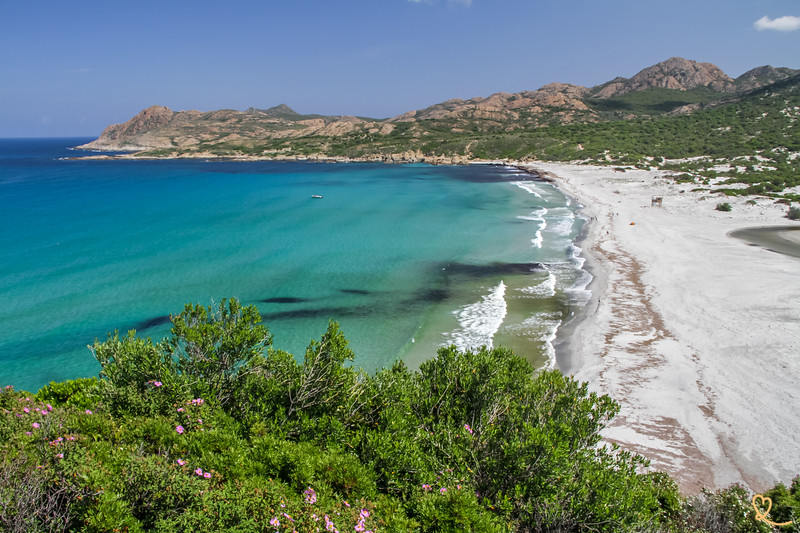
Where to stay

Combination with the calanques de Piana by boat
And of course, don’t miss the nearby calanques of Piana.
The colors are similar but the structure is completely different. This rock is really hard, that’s why the erosion didn’t impact much the cliffs. They dive directly into the water. That’s pretty impressive.
See more photos on our article on the calanques de Piana Corsica.



